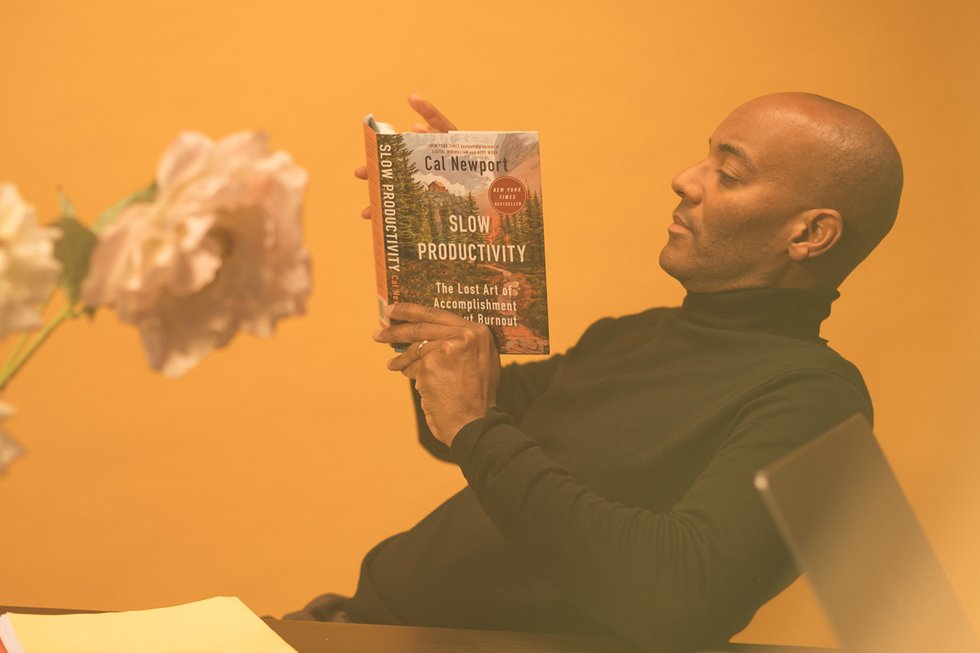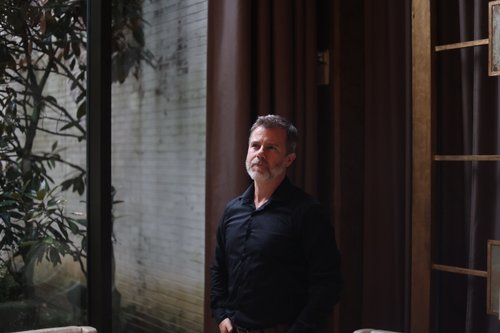Cal Newport's Slow Productivity: Redefining success in a hustle culture
Dec 19, 2024
6 mins


Toronto expat and Paris-based journalist
Cal Newport’s strategy for working through his own professional struggles is to write a book about it.
When he was under pressure to produce impactful work while trying to secure tenure at Georgetown University as a professor of computer science, Newport wrote his 2016 bestseller about the importance of achieving Deep Work. After successfully getting tenure and finding himself drowning in administrative work, he railed against the “tyranny of the inbox” in his 2021 book A World Without Email. And his latest book, Slow Productivity: The Lost Art of Accomplishment Without Burnout published earlier this year, was written in response to the collective burnout experienced during the pandemic which upended people’s relationship with work.
“A lot of these principles came from my life and a lot of them are aspirational. You often write the books you need,” says Newport. “Slow Productivity is, in part, me trying to think through a game plan for myself. What resonates with me? What am I doing? What do I still need to do?”
What Newport argues in Slow Productivity is that modern hustle culture has led to performative busyness, or what he calls ‘pseudo-productivity,’ among knowledge workers. We’ve lost our way, he says, confusing rapid-fire replies to Slack messages and emails at 8 pm for productivity, leaving little room for meaningful, thoughtful output.
So, how can we slow down our work lives to tap into this revolutionary take on productivity? Newport takes us through the key ideas laid out in Slow Productivity.
How Newport redefines productivity
“The pandemic was the tipping point for a lot of people. They said, ‘this isn’t working, this isn’t productivity, this is exhausting.’ It’s also nihilistic, we’re not really producing things that are valuable, we’re all just chatting with each other as fast as possible,” Newport says. “There’s something rotten going on here.”
While the metrics for productivity in automobile factories or farming are clear cut—yield per acre of land and the number of automobiles produced per hour, respectively—productivity among knowledge workers is ill-defined (Newport’s definition of a knowledge worker includes everyone from computer programmers, marketers, and accountants, to writers, scientists, and musicians).
“We’re not really producing things that are valuable, we’re all just chatting with each other as fast as possible.”
In the absence of a standard definition of productivity in the knowledge sector, visible activity is used as a crude proxy for actual productivity, he writes.
“If you can see me in my office—or, if I’m remote, see my email replies and chat messages arriving regularly—then at the very least, you know I’m doing something.”
The 3 principles of slow productivity
His solution to cutting down pseudo-productivity and avoiding burnout? A return to the basics, with a three-pronged strategy that challenges us to rethink the way we work and the way we measure productivity.
“If you can see me in my office—or, if I’m remote, see my email replies and chat messages arriving regularly—then at the very least, you know I’m doing something.”
1. Do fewer things
Newport acknowledges that the knee-jerk reaction could be to scoff at this first principle. Those who work under the close supervision of managers, for instance, don’t exactly have the agency to decline work requests.
But there’s an important caveat, he says: do fewer things, concurrently.
For those of us who have a frenetic tendency to multitask and work on several different projects simultaneously, Newport reminds us to reorganize our schedules—be it whole months, weeks, or days—so that we focus wholly on one project at a time.
“If you work on fewer things concurrently, the quality of the work is higher and your overall rate at which things get done actually goes up,” he says.
Because every new project comes with what Newport calls ‘overhead tax,’ accompanying administrative chores like emails and meetings. “Small tasks can act like productivity termites,” he writes in the book. The more projects, the more overhead tax, which eats into the day and steals valuable time away from core work.
“If you work on fewer things concurrently, the quality of the work is higher and your overall rate at which things get done actually goes up.”
It’s a message that could resonate more with entry-level knowledge workers who might have a tendency to take on too much and stretch themselves thin in an attempt to prove their worth in the workplace.
“When you approach a project without the hurried need to tend to many barely-contained fires, you enjoy a more expansive sense of experimentation and possibility,” he writes. “Maybe you’re able to identify a clever new business strategy, devise an elegant algorithm, or come up with a bold advertising campaign that would have eluded you in a fragmented state of attention.”
2. Work at a natural pace
“Working with incessant intensity is artificial and unsustainable. In the moment, it might exude a false sense of usefulness, but when continued over time, it estranges us from our fundamental nature, generates misery, and from a strictly economic perspective, almost certainly holds us back from reaching our full capabilities,” he writes.
Using case studies like artist Georgia O’Keefe, who spent her summers in Lake George to paint, Isaac Newton who retreated to rural Lincolnshire to ponder the laws of gravity, and physicist Marie Curie who recharged from her life in the lab in the French countryside, Slow Productivity argues that knowledge workers who are expected to toil year-round and produce at a steady pace are the outliers.
“Working with incessant intensity is artificial and unsustainable.”
Taking inspiration from the quiet quitting movement which peaked in 2022, in which disengaged and disenchanted employees put in the bare minimum at work, Newport suggests that ‘quietly quitting’ a single season every year—be it the quiet summer months, or the end of the year—is actually good for our natural work rhythm.
“You wouldn’t make a big deal about the decision. You would just, for a lack of a better word, quietly implement it before returning without fanfare to a more normal pace,” he writes.
Scheduling seasons is also a big part of his own work life, Newport says, which allows him to step back and recharge. “Seasonality is a big thing. I have many different scales, including whole seasons. My summers are very slow, and some semesters are busier than others.”
3. Obsess over quality
“Obsess over the quality of what you produce, even if this means missing opportunities in the short term. Leverage the value of these results to gain more and more freedom in your efforts over the long term,” reads the final chapter.
To illustrate his point, Newport devotes a surprising amount of ink to the singer Jewel (readers are left knowing practically her entire life story), who famously turned down a million-dollar signing bonus while homeless in order to hone her art.
“Obsess over the quality of what you produce, even if this means missing opportunities in the short term.”
He advises taking an interest in an unrelated discipline (his is cinema) to not only inspire creativity and brilliance, but to help us slow down (the human tendency is to be “wildly optimistic” about how much we can get done) in order to produce something great.
It’s a principle that applies more for readers working on loftier goals, or maybe passion projects on the side, and assumes that the reader prioritizes work-life balance over financial freedom.
Slow Productivity might not be for everyone…
Money-motivated readers might be disheartened to read case studies of successful entrepreneurs who willingly took pay cuts in order to have more time off. There is no magic formula here for reworking productivity without sacrificing income.
Likewise, though Newport says in conversation that he designed the book with standard office workers in mind, he acknowledges several times in the book that his advice is more applicable to autonomous knowledge workers such as freelancers, solopreneurs, small business owners, or those in academia. Because for many office workers, taking an afternoon off to see a matinee for a mental reset, as he suggests in the book, could be grounds for a firing.
Slow Productivity also misses the opportunity to call out those who built this hustle culture, placing the responsibility to combat it not in the hands of those who enforce it, but those who are oppressed by it. Managers and leaders indeed play a key role in ensuring the mental health and work-life balance of their employees.
“We need to rethink productivity, something’s broken, and not just from an intellectual standpoint, but from a practical standpoint.”
It’s also important to remember that Newport wrote the book during the pandemic, when disillusionment and burnout birthed major labor movements. Pre-pandemic, the anti-productivity movement was considered an intellectual, anti-capitalist act of resistance. Today, it’s evolved from the fringes into mainstream public discourse.
“I do think there is an evolution of this now where people are thinking a little bit more pragmatically,” he said. “We need to rethink productivity, something’s broken, and not just from an intellectual standpoint, but from a practical standpoint.”
Photo: Welcome to the Jungle
Follow Welcome to the Jungle on Facebook, LinkedIn, and Instagram and subscribe to our newsletter to get our latest articles every week!

More inspiration: Future of Work

The Bear: When professional passion turns toxic
Carmy's workplace trauma isn't unique...
Dec 31, 2024

The youth have spoken: South Korea’s push for a four-day workweek
Is this the end of Korean hustle culture?
Dec 26, 2024

Wellbeing washing: Are workplace mental health apps doing more harm than good?
Workers are struggling with mental health. Are employers approaching it the right way?
Dec 19, 2024

Dark side of DINKs: Working as a childfree adult
Having children comes with challenges. So does choosing not to.
Dec 11, 2024

Debunking the American Dream with Benjamin C. Waterhouse
Has our economic past and the rise of gig work poisoned our ideas of success?
Nov 13, 2024
Inside the jungle: The HR newsletter
Studies, events, expert analysis, and solutions—every two weeks in your inbox

